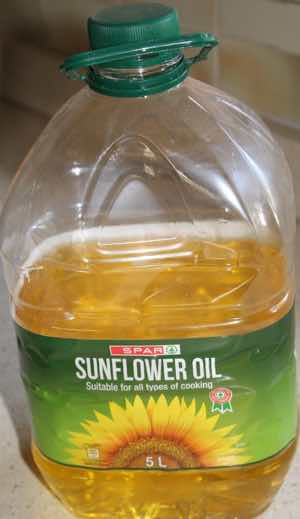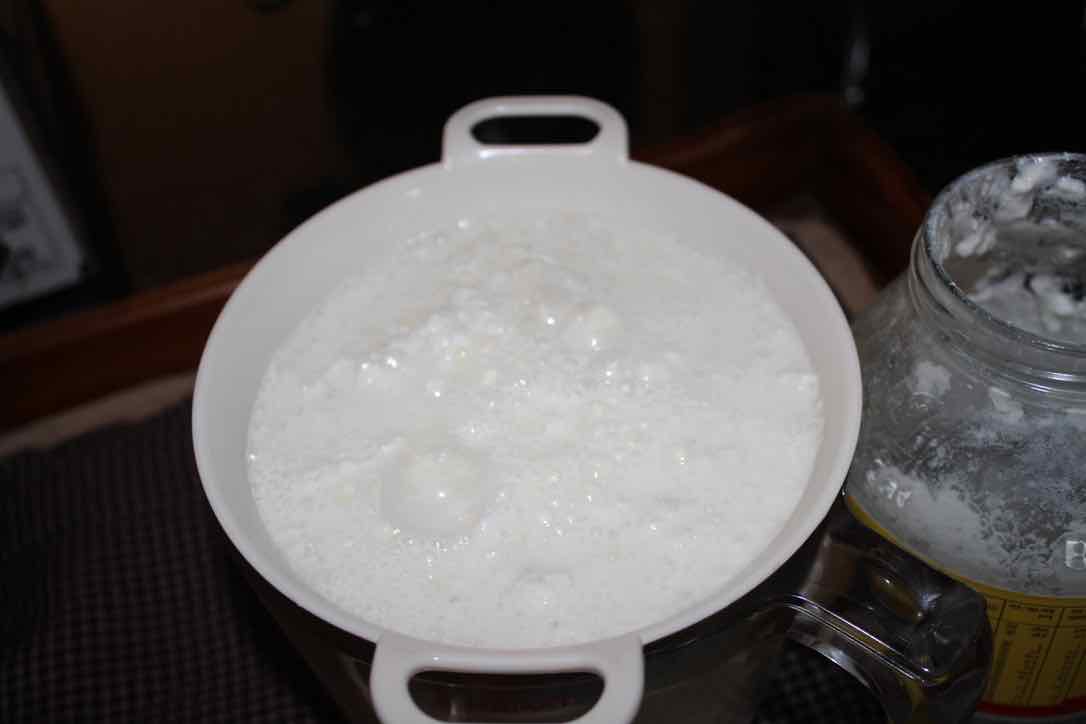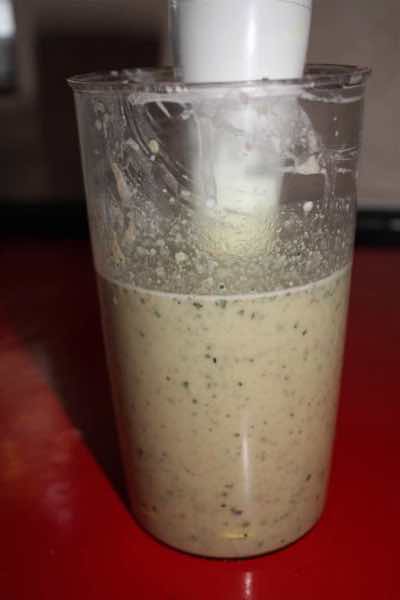- Bernard Preston homepage
- Keto
- Linoleic Acid in Sunflower and Soybean Oil Promotes Inflammation
Linoleic acid in sunflower and soybean oil promotes inflammation
The excessive amount of linoleic acid in sunflower and soybean oil promotes inflammation by altering the omega-6 to 3 ratio; this has been shown to increase the prevalence of Irritable Bowel Disease and prostatitis.
A diet high in linoleic acid has long been connected with IBD; yet it is an "essential" fat. We cannot live without this nutrient; but is it too much of a good thing?
 Good in small amounts.
Good in small amounts.Linoleic acid
Too much of a good thing
Linoleic acid is an essential fat. Human bodies cannot synthesise it and so it must be obtained from our food. It forms an integral part of cell membranes, controlling the movement of water across the skin barrier in particular.
But it is an omega 6 fat; so in excess it becomes inflammatory. As the parent of arachidonic acid, too much of a good thing may lead to the excessive and prolonged release of eicosanoids after injury; via the cyclo-oxygenase enzyme pathway and hence the development of drugs called NSAIDs which block this mechanism.
So it's complicated science which we do not have to understand. Just accept what the scientists are telling us; omega-6 fatty acids are essential but in excess are inflammatory.
Soybean oil also contains some ALA, alpha linolenic acid, an omega 3 fat; that which is anti-inflammatory but the amount is relatively small.
The Greek omega symbol is often used; thus Ω-3.
Be careful not to confuse linoleic acid with its excellent sister.
Linolenic acid the Ω-3 fatty acid is a pole apart; it's wholly good and we get too little from the traditional grocery store diet.
SUMMARY
- Linoleic acid is an essential polyunsaturated fat; but it is omega-6.
- Alpha Linolenic Acid is also an essential fat; but it is omega-3.
It's all about the ratio; too much omega-6 is highly inflammatory.
Soybean oil
- PUFAs
- Linoleic acid Ω-6
- Linolenic acid Ω-3
58g of total PUFAs/100g
51g linoleic acid
6.6g linolenic acid
Ratio of Ω-6/ Ω-3
51/6.6 = 7.7
The ideal ratio for omega-6 to 3 is generally considered below 4. In soybean oil it is nearly double; that is considered inflammatory.
Sunflower oil
- PUFAs
- Linoleic acid Ω-6
- Linolenic acid Ω-3
- Oleic acid MUFA
85g of total PUFAs/100g
60g linoleic acid
± zero ALA Ω-3
40 g oleic acid
Ratio of Ω-6/ Ω-3
= extremely high
When considering the ratio of omega-6 to 3 it is extremely high; however the saving grace of sunflower oil is its oleic acid content. In addition it also has when cold pressed relatively large amounts of vitamin E; but very little when solvent extracted at extreme temperatures.
Oleic acid is the fat that is considered to make olive oil and avocados so nutritious and beneficial; the undisputed queen of the lipids.
High temperature solvent extraction
Another negative in the use of both soybean and sunflower oils is that the fat is extracted using a solvent, hexane at high temperatures; the vitamin E is destroyed. They are now considered ultra-processed foods that contribute large amounts of energy from linoleic acid but little in the way of other nutrients.
10% of our energy requirements
Due to the excessive consumption of soybean and sunflower oils the average person eating typical grocery store food, the so-called industrial diet is today getting around 10% of their energy requirements from linoleic acid. But our bodies require less than 2 percent.
This huge rise in the quantity of this omega-6 fat in our food has upset the apple cart; it throws the ratio of six to three way out of balance. The extreme increase in the amount of linoleic acid in sunflower and soybean oil consumed coincides with the rise of chronic inflammatory diseases in the last fifty years; but is it the cause?
And what is the mechanism?
Inflammatory bowel disease
A new study from the University of California[1] confirms what scientists already know; that the huge increase in these oils in processed foods is causing ulcerative colitis, obesity and diabetes. But what they were looking for was the mechanism by which this was happening.
Now we know; it's due to the adverse affect on the microbiome.
"A meta-analysis reported that consuming high levels of Ultra Processed Foods can increase the risk for IBD by 47% in adults."
Endo-cannabinoids
Endo-cannabinoids are naturally occurring neurotransmitters; in complex ways they target cells all over the body helping to keep us in balance. For example they regulate sleep, appetite and generalised inflammation amongst many other functions[2].
They are produced naturally by many different tissues in the brain, muscles and circulating cells, for example. What astonished the researchers at UC was they found that the friendly bacteria in the gut, the so-called microbiome, also synthesise these helpful cannabinoids that assist in regulating the body's functions; especially protection against inflammatory bowel disease.
These endo-cannabinoids are formed from enzyme action on the important omega 3 fatty acids.
"Enzymes that break down fatty acids are shared between two pathways. If you swamp the system with linoleic acid, you'll have less of these ferments available to metabolize omega-3s into good endocannabinoids."
- Professor Frances Sladek
E. coli
Here's the catch. E.coli in the gut is a pathogen that thrives on linoleic acid; in the research it is strongly linked to a decrease in these good cannabinoids. The body has greater difficulty getting back into balance after being tipped over for one reason or another; we become more prone to chronic inflammatory diseases.
As the amount of linoleic acid from our food increases above that essential 2%, E. coli flourishes and the helpful bacteria die off according to Dr Frances Sladek, professor of cell biology at UC; and the Endo-Cannabinoid System is thus also negatively affected.
Obesity
As the friendly bacteria in the gut die off from high levels of linoleic acid, not only do the cannabinoids decrease; the "oxylipins" which are strongly correlated with obesity simultaneously rise in number. And that is the start of Fatty Pancreas.
These industrial diet oils make us fat and our bodies angry not just from increased calories but also because they disturb profoundly important things going on in our cells; like the Endo-Cannabinoid System and the microbiome. Generalised inflammation is the result; pain and chronic diseases like diabetes and prostatitis.
We can all benefit from these gems from a weight loss conference; the medics have profoundly interesting science-based ideas that work.
Benign prostate enlargement
With King Charles of the UK in the news suffering from benign prostate enlargement, the generalised inflammation of excessive linoleic acid from our food has again come under the spotlight. A urologist in Windsor, Marc Laniado blames lack of exercise and "certain dietary fats."
It's time to start walking more often, King Charles; and eating less of those fast foods cooked in sunflower and soybean oil. Perhaps what is needed is a new chef in the royal kitchen; one more concerned about nutrition and your wellness than your taste buds.
Be sure to tell him as a condition of employment that excessive linoleic acid in sunflower and soybean oil promotes inflammation; a reason for instant dismissal.
Leaky gut
Without getting into the complex science, the researchers have also discovered that high levels of the omega-6 linoleic acid, found for example in sunflower and soybean oils also weakens the intestinal barrier; that allows noxious substances in the gut into the blood stream.
It also explains why a high omega 6 to 3 ratio has long been associated with generalised inflammation and pain in the body.
Broad beans yield large amounts of fibre and the L dopa that the body needs to synthesise the so-called catacholamines that are essential for bowel health. You are unlikely to find them in the grocery store.
Take home
The take home from the authors is as follows.
- We should use more olive oil in our cooking; it is neutral in relation to the omegas.
- Eat more foods containing omega-3 fatty acids; fish, freshly ground flaxseed and walnuts.
- Avoid processed foods which generally contain large amounts of linoleic acid[4].
To which I would add my pennyworth.
- At least on a weekly basis make sure we are enjoying unpasteurised probiotic foods such as kefir, sauerkraut and kimchi; yoghurt contains a limited range of these friendly bacteria.
Kefir

Kefir is probably the simplest probiotic to make in the home kitchen; it contains over 30 species of friendly bacteria, yeast cells and viruses. It takes about five minutes to strain the whey from the curds and turn it into a delicious, healthful smoothie.
 A kefir breakfast smoothie
A kefir breakfast smoothieLinoleic acid in sunflower and soybean oil promotes inflammation
Linoleic acid in sunflower and soybean oil promotes inflammation by altering the omega-6 to 3 ratio.
This is known to increase the likelihood of us suffering from one of the inflammatory bowel syndromes; like Crohn's Disease and ulcerative colitis.
Do not confuse it with linolenic acid; that is a very beneficial omega-3 fat found predominantly in fish, seeds and some plants.
Its full name is alpha linolenic acid; or ALA for short.
A healthy diet for prediabetes suggests limiting carbs, walking after starchy meals and eating more plant fats which are neutral in the omegas; like avocados and olive oil.
When browsing use right click and "Open Link in New Tab" or you may get a bad gateway signal.
Newsletter
Our newsletter is entitled "create a cyan zone" at your home, preserving both yourself and Mother Earth for future generations; and the family too, of course. We promise not to spam you with daily emails promoting various products. You may get an occasional nudge to buy one of my books.
Here are the back issues.
- Lifestyle and ideal body weight
- What are ultra-processed foods?
- Investing in long-term health
- Diseases from plastic exposure
- Intensive lifestyle management for obesity has limited value
- A world largely devoid of Parkinson's Disease
- The impact of friendly bacteria in the tum on the prevention of cancer
- There's a hole in the bucket
- Everyone is talking about weight loss drugs
- Pull the sweet tooth
- If you suffer from heartburn plant a susu
- Refined maize meal and stunting
- Should agriculture and industry get priority for water and electricity?
- Nature is calling
- Mill your own flour
- Bake your own sourdough bread
- Microplastics from our water
- Alternative types of water storage
- Wear your clothes out
- Comfort foods
- Create a bee-friendly environment
- Go to bed slightly hungry
- Keep bees
- Blue zone folk are religious
- Reduce plastic waste
- Family is important
- What can go in compost?
- Grow broad beans for longevity
- Harvest and store sunshine
- Blue zone exercise
- Harvest and store your rainwater
- Create a cyan zone at your home
Did you find this page interesting? How about forwarding it to a friendly book or food junkie? Better still, a social media tick would help.
- Bernard Preston homepage
- Keto
- Linoleic Acid in Sunflower and Soybean Oil Promotes Inflammation
Address:
56 Groenekloof Rd,
Hilton, KZN
South Africa
Website:
https://www.bernard-preston.com